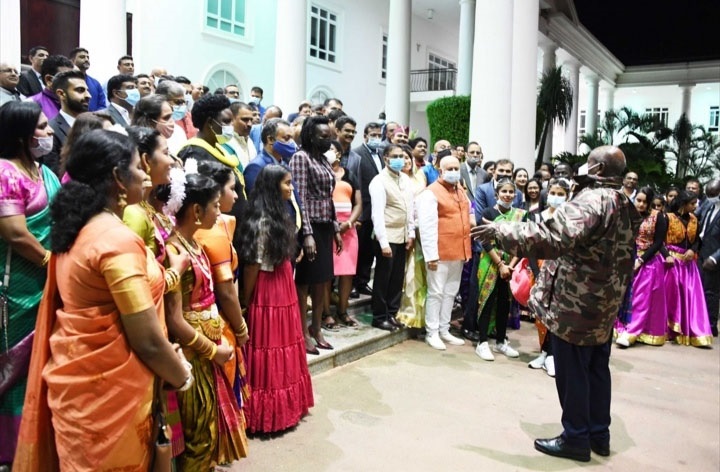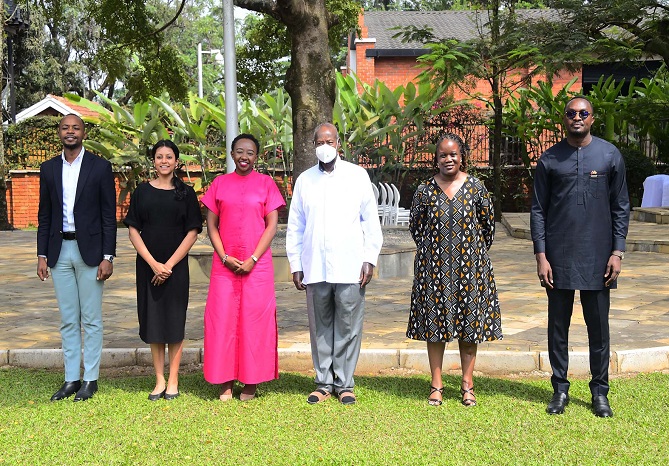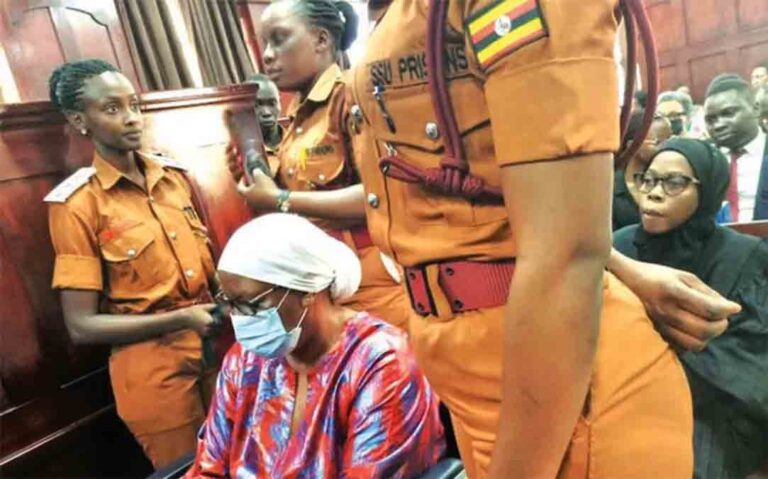
President Museveni speaking to the Indians during the past Diwali
HABARI DAILY I Kampala, Uganda I President Museveni has promised to recognise Indians as a tribe in Uganda, in fulfilment of the long-standing request by the 40,000 member strong community.
The 1995 Ugandan constitution recognizes 56 tribes, though a later amendment has changed the official count to 65 indigenous communities.
The Indian community had previously requested recognition as a tribe, arguing it would guarantee nationality for their children and end their status as foreigners despite living and working in the country for generations.
The call was first made in 2017, and discussions resurfaced in 2021 when they met President Yoweri Museveni.
The Indians got a positive node today while being hosted for dinner to mark Diwali or Festival of Lights, at State House Entebbe.
“Regarding nation citizenship, the Indians deserve to become the newest tribe in Uganda,” said Museveni.
He said that the issue of citizenship for the Indians is very simple, because all Ugandan groups came into the country from somewhere.
“Even some of the indigenous tribes came as far away as Cameroon, all the way here,” he said, adding that others came from Egypt, through Ethiopia.
“Then our people from northern Uganda came not so long ago from Sudan. Then even in the time of the British, if you go to a place Bombo, there is a group of people called Nubians.
“These Nubians came as soldiers from the British. And they stayed here. They are now part of Uganda.
Museveni said that the Indians qualify to become another tribe in Uganda because they came at the same time as the Nubians.
“Because they were all initially brought by the British. So why shouldn’t the Indians qualify, while the Nubians have?
Economic gains lost
Museveni said that when Idi Amin chased away the Indians in 1972, Uganda as a country lost much more than the Indians.
“Although there were two or three killed by Indians killed by Amin, he slayed about 500,000 Africans. And then he damaged our economy because the Indians had created alot of wealth and were supporting Uganda’s economy. But we stayed here with a collapsed economy. So, Idi Amin did more damage to the Africans than to the Indians.”
Museveni said that he was glad to hear that the population of Indians in Uganda has grown to 40,000. “At one tome, I went to an Indian temple in London and I found some Indians who narrated that Idi Amin grabbed their property.
“I told them to stop wasting our time. The property of the Indians, which numbered about 3,000 had been restored to them. We created a conducive environment for them to return and invest in Uganda,” he said.
Evelyn Anite, Privatisation and Investment state minister also backed the proposal to have Uganda’s Indian community recognised as a tribe.
She said the Indian community deserves to be recognised as a tribe because it has immensely contributed to Uganda’s economic development for over 120 years.
“The Indian community has made a huge contribution to Uganda’s gross domestic product [GDP]. They engage in manufacturing, which contributes 26% to the GDP,” Anite said.
100 years of Hinduism
President Yoweri Museveni has received a silver coin symbolising 100 years of Hinduism in Uganda.
The coin, which was presented by Dr Sudhir Ruparelia, the CEO of the Ruparelia Group.
Pareth Mehta, the chairman of the India Association Uganda hailed President Museveni for the peace that that is prevailing in the country, and has enabled them to invest in the country and create jobs for the locals.
He said that the hospitality of Ugandans has made generations of Indians feel at home. “Ugandan has given us not just a place to live but a sense of belonging. The welcoming spirit allows us to celebrate our heritage openly, to integrate seamlessly, and to preserve our traditions while contributing to the beauty of this country,” he said.
He added that under President Museveni’s visionary leadership, Uganda has witnessed remarkable stability, economic reforms and investor-friendly policies.
“These have enabled our community to invest confidently in sectors such as manufacturing, real estate, construction, banking, ICT, agriculture and services. This has significantly enabled this community contribute to national development and development,” he said.
Members of the Indian community arrived in Uganda in the 1890s as labourers working on the Uganda Railway that the British were constructing from Mombasa to Uganda.
When the project ended, most of them stayed behind, taking on trade and business as their specialty.
By 1970, their population was estimated to be between 80,000 and 100,000. In August 1972, president Idi Amin ordered them to leave Uganda in 72 days. Some of them only returned after the collapse of the Amin regime in 1979.




